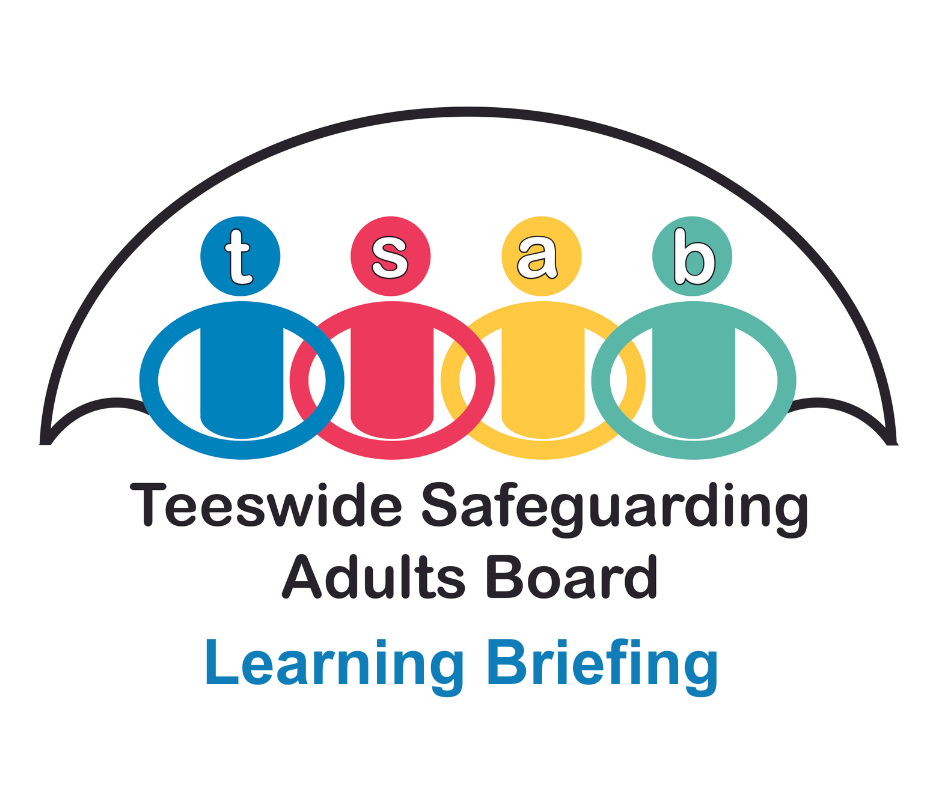
1. Background
Bernadette was a 32-year-old white female who lived in rented accommodation with her male partner. Bernadette was known to a number of services, she had a history of drug and alcohol abuse, she suffered from depression, had a number of physical health issues including diabetes and her engagement with services was inconsistent. She had also been identified as a victim of domestic abuse and had previously been subject of MARAC.
Bernadette had contact with health services on a number of occasions in the last six months of her life, this included attending A&E on two occasions. On the day before her death, she presented to acute services with injuries but left prior to examination, she was deemed to have capacity with respect to this decision. Following her death, the TSAB commissioned a SAR, this briefing document has been created to share key learning points identified
2. Theme 1: Professional Curiosity
In Bernadette’s case, decisions were often made by practitioners who weren’t sighted on all of the relevant information, accepting information at face value and not using professional curiosity to better understand the risks that Bernadette faced.
Although there were examples of good practice, in particular the use of assertive outreach to try and build positive relationships and to overcome barriers to engagement, agencies worked in silos with limited information sharing/risk assessment.
The review noted the MARAC pilot and changes to working practices/training for practitioners which should improve the quality of referrals. The increase in frequency of meetings will increase the capacity within the process.
3. Theme 2: Executive Capacity and Compulsive Behaviours
When considering executive capacity, practitioners need to consider the impact that compulsive behaviours, including both substance misuse and self-neglect, may have on an adult’s ability to weigh and use information. Specifically, when dealing with adults who self-neglect or misuse substances, they should not only consider the adult’s ability to understand and reason through the elements of a decision in the abstract, they also need to consider the person’s ability to put the decision into practice and to execute it at the appropriate moment.
4. Theme 3: Consent to Share
Consent to share safeguarding information with partner agencies is a challenging one for safeguarding professionals.
It is rightly recognised that adults may choose not to consent to professionals sharing information about them with other agencies for a variety of reasons, in general, their wishes should be respected. There are circumstances where professionals can reasonably override the lack of consent:
- The adult lacks capacity-consider both decisional and executive capacity.
- Emergency or life-threatening situations may warrant sharing.
- Other people are or may be at risk of harm.
- Sharing information could prevent a serious crime or a serious crime has been committed.
- The risk of harm is high and a duty of care needs to be considered.
Decisions to override consent should be carefully record and appropriate advice sought.
5. Theme 4: Using the Section 42 Framework
Bernadette had care and support needs and was at risk of domestic abuse and neglect, (self-neglect), yet there were no safeguarding referrals made between 2019 and October 2022. The s42 enquiry provides a framework for cross agency information sharing, risk assessment and shared responsibility. The s42 enquiry also has the advantage of placing a statutory duty to co-operate on agencies.
Determining the threshold for a s42 enquiry when dealing with self-neglect or domestic abuse, should be done on a case-by-case basis, but where there is evidence of compulsive behaviours, practitioners need to consider how that will impact on the adult’s ability to protect themselves by controlling their own behaviour. In Bernadette’s case, she was addicted to ‘crack cocaine’, a highly addicted drug, she was also in an abusive and coercive relationship, this would have impacted on her ability to protect herself from harm through abuse/neglect, meeting the threshold for s42.
6. Theme : DARD Process
The Drug and Alcohol Related Deaths, (DARD) process is a six weekly cross agency meeting where the relevant agencies share information and review those deaths where drugs or alcohol were considered to be a significant issue. The purpose of the process is to identify common themes and potential learning. Whilst this is a new and evolving process, this Safeguarding Adult Review recognised this as good practice that practitioners need to be aware of.
7. What to do now:
Reflect on how the above themes link with your work with adults, families and other professionals.
Consider how you might adapt your practice based on this learning.
Discuss within team meetings and explore any training/development needs.
What to do next:
Check out the below information and share with your team:
- Safeguarding E-Learning Courses
- Self-Neglect Training Workbook
- TSAB Training Courses and Events
- TSAB Policies, Procedures and Guidance (including Mental Capacity Act Guidance)
- Social Care Institute for Excellence (SCIE) – Guidance on Information Sharing
Version: 1
Published: January 2024